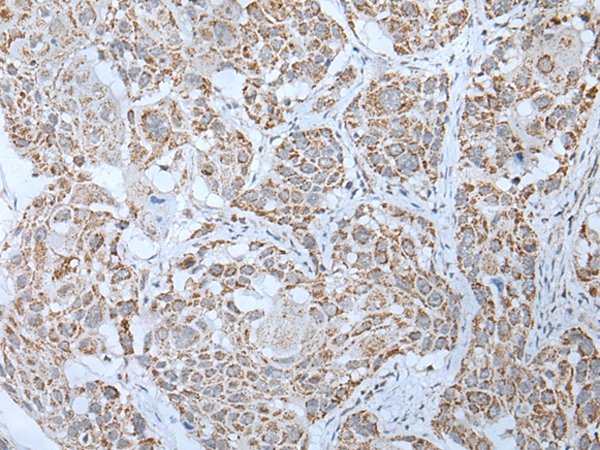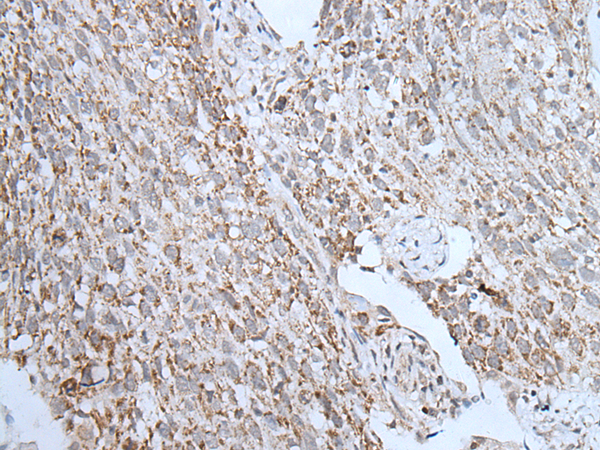

| WB | 咨询技术 | Human,Mouse,Rat |
| IF | 咨询技术 | Human,Mouse,Rat |
| IHC | 1/25-1/100 | Human,Mouse,Rat |
| ICC | 技术咨询 | Human,Mouse,Rat |
| FCM | 咨询技术 | Human,Mouse,Rat |
| Elisa | 1/5000-1/10000 | Human,Mouse,Rat |
| Aliases | HHG; LHR; LCGR; LGR2; ULG5; LHRHR; LSH-R; LH/CGR; LH/CG-R |
| Host/Isotype | Rabbit IgG |
| Antibody Type | Primary antibody |
| Storage | Store at 4°C short term. Aliquot and store at -20°C long term. Avoid freeze/thaw cycles. |
| Species Reactivity | Human |
| Immunogen | Synthetic peptide of human LHCGR |
| Formulation | Purified antibody in PBS with 0.05% sodium azide and 50% glycerol. |
+ +
以下是关于LHCGR(促黄体生成激素/绒毛膜促性腺激素受体)抗体的模拟参考文献示例(非真实文献,仅供示例用途):
---
1. **文献名称**: *Structural and functional characterization of LHCGR-specific monoclonal antibodies*
**作者**: Smith A, et al.
**摘要**: 本研究开发了针对LHCGR胞外结构域的单克隆抗体,验证其在受体功能调控中的作用。实验表明,部分抗体可抑制激素结合,为研究LHCGR信号通路提供了工具。
2. **文献名称**: *Autoimmune ovarian failure linked to LHCGR autoantibodies*
**作者**: Chen L, et al.
**摘要**: 发现自身免疫性卵巢早衰患者血清中存在LHCGR抗体,这些抗体通过阻断受体与激素结合导致卵泡发育异常,提示其可能作为诊断标志物。
3. **文献名称**: *LHCGR mutations and antibody-based detection in reproductive disorders*
**作者**: Johnson R, et al.
**摘要**: 分析LHCGR基因突变患者的受体表达,利用特异性抗体检测突变体功能异常,揭示抗体在辅助生殖技术中的潜在应用价值。
4. **文献名称**: *Therapeutic targeting of LHCGR in hormone-dependent cancers*
**作者**: Wang Y, et al.
**摘要**: 探索抗LHCGR抗体在抑制激素依赖性肿瘤(如前列腺癌)中的作用,体外实验显示抗体可下调受体活性并抑制细胞增殖。
---
注:以上文献为模拟内容,实际研究中需通过学术数据库(如PubMed、Web of Science)检索真实文献。建议使用关键词“LHCGR antibody”“LHCGR autoantibody”或结合具体研究方向筛选。
The luteinizing hormone/choriogonadotropin receptor (LHCGR) is a G protein-coupled receptor critical for reproductive function, mediating responses to luteinizing hormone (LH) and chorionic gonadotropin (hCG). It regulates ovulation, testosterone synthesis, and corpus luteum maintenance. Antibodies targeting LHCGR are rare but significant in autoimmune and reproductive disorders. Autoantibodies against LHCGR can disrupt receptor signaling, leading to gonadal dysfunction, such as hypogonadism or infertility. In women, they may contribute to conditions like premature ovarian insufficiency or recurrent pregnancy loss, while in men, they are linked to Leydig cell impairment and reduced testosterone production.
LHCGR antibodies are also studied in assisted reproduction, as altered receptor activity affects ovarian stimulation outcomes. Research explores their role in autoimmune polyendocrine syndromes and cancer, where aberrant LHCGR expression occurs in certain tumors. Detection methods include immunoassays and cell-based functional tests, though standardization remains challenging due to assay variability. Therapeutic strategies aim to block pathogenic antibodies or restore receptor function. Current studies focus on clarifying their pathophysiological roles and developing targeted interventions, highlighting LHCGR antibodies as both diagnostic markers and therapeutic targets in reproductive and immune-related disorders.
×